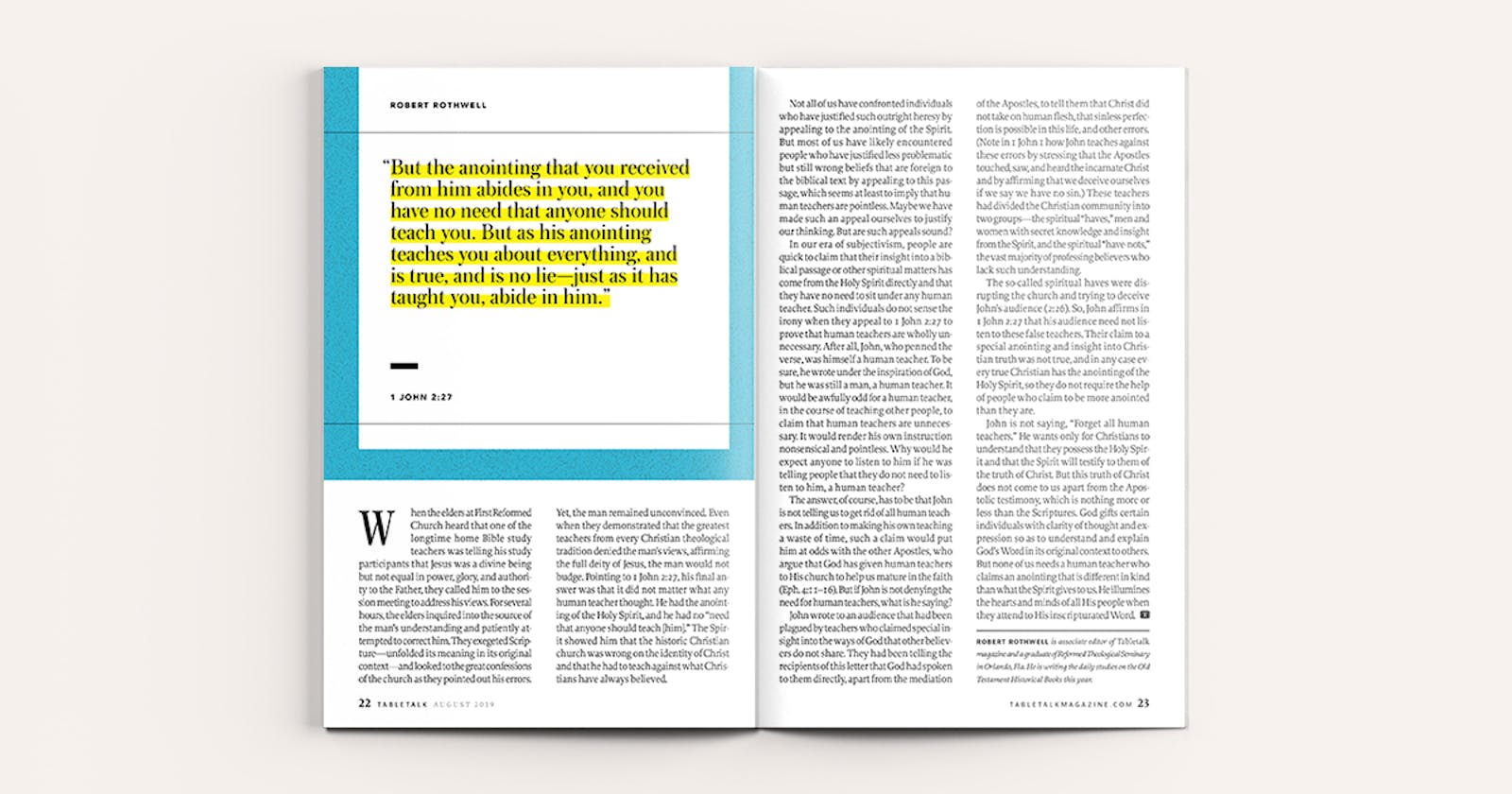
Request your free, three-month trial to Tabletalk magazine. You’ll receive the print issue monthly and gain immediate digital access to decades of archives. This trial is risk-free. No credit card required.
Try Tabletalk NowAlready receive Tabletalk magazine every month?
Verify your email address to gain unlimited access.
When the elders at First Reformed Church heard that one of the longtime home Bible study teachers was telling his study participants that Jesus was a divine being but not equal in power, glory, and authority to the Father, they called him to the session meeting to address his views. For several hours, the elders inquired into the source of the man’s understanding and patiently attempted to correct him. They exegeted Scripture—unfolded its meaning in its original context—and looked to the great confessions of the church as they pointed out his errors. Yet, the man remained unconvinced. Even when they demonstrated that the greatest teachers from every Christian theological tradition denied the man’s views, affirming the full deity of Jesus, the man would not budge. Pointing to 1 John 2:27, his final answer was that it did not matter what any human teacher thought. He had the anointing of the Holy Spirit, and he had no “need that anyone should teach [him].” The Spirit showed him that the historic Christian church was wrong on the identity of Christ and that he had to teach against what Christians have always believed.
Not all of us have confronted individuals who have justified such outright heresy by appealing to the anointing of the Spirit. But most of us have likely encountered people who have justified less problematic but still wrong beliefs that are foreign to the biblical text by appealing to this passage, which seems at least to imply that human teachers are pointless. Maybe we have made such an appeal ourselves to justify our thinking. But are such appeals sound?
In our era of subjectivism, people are quick to claim that their insight into a biblical passage or other spiritual matters has come from the Holy Spirit directly and that they have no need to sit under any human teacher. Such individuals do not sense the irony when they appeal to 1 John 2:27 to prove that human teachers are wholly unnecessary. After all, John, who penned the verse, was himself a human teacher. To be sure, he wrote under the inspiration of God, but he was still a man, a human teacher. It would be awfully odd for a human teacher, in the course of teaching other people, to claim that human teachers are unnecessary. It would render his own instruction nonsensical and pointless. Why would he expect anyone to listen to him if he was telling people that they do not need to listen to him, a human teacher?
The answer, of course, has to be that John is not telling us to get rid of all human teachers. In addition to making his own teaching a waste of time, such a claim would put him at odds with the other Apostles, who argue that God has given human teachers to His church to help us mature in the faith (Eph. 4:11–16). But if John is not denying the need for human teachers, what is he saying?

John wrote to an audience that had been plagued by teachers who claimed special insight into the ways of God that other believers do not share. They had been telling the recipients of this letter that God had spoken to them directly, apart from the mediation of the Apostles, to tell them that Christ did not take on human flesh, that sinless perfection is possible in this life, and other errors. (Note in 1 John 1 how John teaches against these errors by stressing that the Apostles touched, saw, and heard the incarnate Christ and by affirming that we deceive ourselves if we say we have no sin.) These teachers had divided the Christian community into two groups—the spiritual “haves,” men and women with secret knowledge and insight from the Spirit, and the spiritual “have-nots,” the vast majority of professing believers who lack such understanding.
The so-called spiritual haves were disrupting the church and trying to deceive John’s audience (2:26). So, John affirms in 1 John 2:27 that his audience need not listen to these false teachers. Their claim to a special anointing and insight into Christian truth was not true, and in any case every true Christian has the anointing of the Holy Spirit, so they do not require the help of people who claim to be more anointed than they are.
John is not saying, “Forget all human teachers.” He wants only for Christians to understand that they possess the Holy Spirit and that the Spirit will testify to them of the truth of Christ. But this truth of Christ does not come to us apart from the Apostolic testimony, which is nothing more or less than the Scriptures. God gifts certain individuals with clarity of thought and expression so as to understand and explain God’s Word in its original context to others. But none of us needs a human teacher who claims an anointing that is different in kind than what the Spirit gives to us. He illumines the hearts and minds of all His people when they attend to His inscripturated Word.
